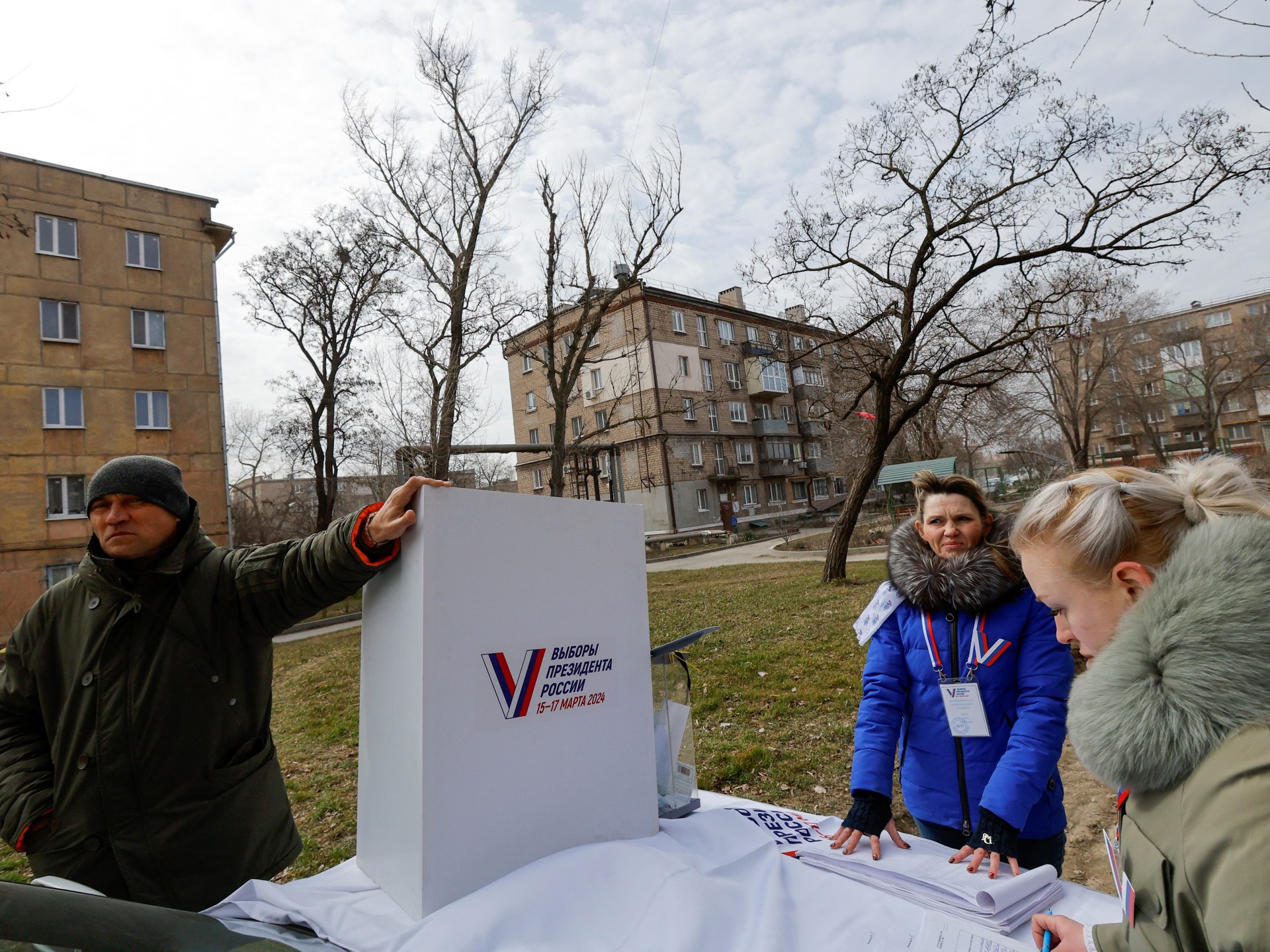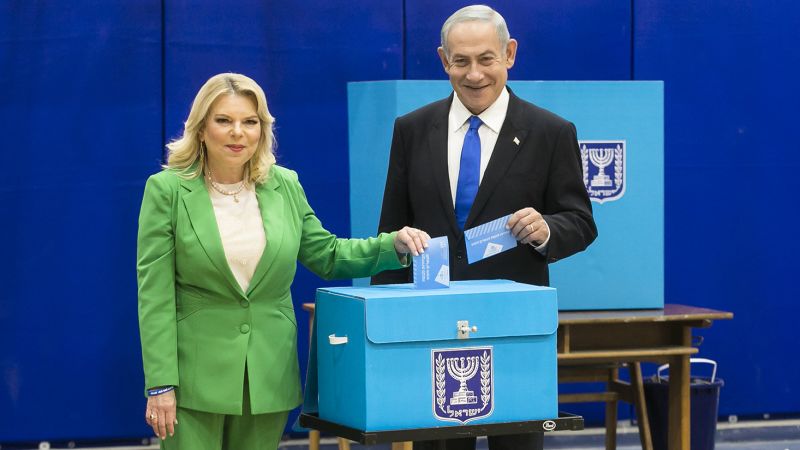At gunpoint, Ukrainians in occupied regions vote in Russia’s election
Since February 25, women with name tags and huge stacks of papers have been knocking on every door in the Russia-occupied parts of four Ukrainian regions or approaching residents outside their apartment buildings or houses.
The documents are lists of voters, and the women and, rarely, men are election officials who usually teach in nearby schools, accept utilities payments or work as government clerks.
They ask residents for their IDs and nudge them to fill in an early ballot form with the names of four candidates in Russia’s presidential election, current and former residents of the occupied areas told Al Jazeera.
One of the candidates is Vladimir Putin, who is all but certain to win his fifth election, and the remaining three presidential hopefuls are figureheads from pro-Kremlin parties whose participation is widely understood by observers as an attempt to create an illusion of choice.
The Ukrainians rarely refuse to fill in the ballot for a very persuasive reason – a masked, gun-toting Russian serviceman towering next to the official and a car filled with more armed men nearby, Al Jazeera has learned.
The “voting” usually takes place near the entrance of an apartment, and the election official along with the armed soldier can see whose name is ticked off on the ballot.
“There’s no secrecy of vote,” a former resident of Mariupol told Al Jazeera, speaking about how her friends and relatives voted on Wednesday.
“People who love Ukraine must submit to the regime and pretend they support everything that’s going on because they’re afraid for their lives.”
She added, however, that there are resistance groups that largely consist of young people who leak information about the numbers and location of Russian soldiers and weaponry to Ukrainian intelligence services.
Some locals hope that their participation in the vote will give them a literal free pass out of the occupied area.
“My father-in-law had a heart attack and died. My mother-in-law’s hair turned grey because of what we had gone through. All we want is to leave and never look back,” Tatyana, who lives in the port of Berdiansk in southern Ukraine, which was occupied in late February 2022, told Al Jazeera.
She and her husband voted early, on Monday, unsurprisingly for Putin because they don’t want to be blacklisted by Russia-appointed authorities.
They plan to cross into southern Russia and take a plane to Kazakhstan, where their relatives agreed to shelter them.
The few Ukrainians who refused to vote or badmouthed the election have been rounded up and taken to “basements”, as informal prisons are known in Russia-occupied parts of Donetsk, Luhansk, Zaporizhia and Kherson regions, according to the Eastern Human Rights Group, a Ukrainian watchdog.
The rights group and the three Ukrainians Al Jazeera interviewed for this article, whose full names will not be used for safety reasons, reported the threat of guns at polling stations in the occupied regions.
So the only way to safely say “no” is to keep the door closed to election officials and avoid the polling stations that opened on Friday, the first day of Russia’s three-day election.
“Nobody touches” those who stay at home, said a former resident of the Russia-occupied southern town of Enerhodar who fled to Kyiv but is in constant contact with her family and friends at home.
The reason is simple – vote-rigging, which has been documented in Russia in previous elections and is widely expected to be even more pronounced in the occupied parts of Ukraine.
“I think the turnout will be 120 to 150 percent,” the former resident quipped.
Observers agreed – and said Kremlin-appointed officials will compete with each other in vote rigging to report large turnouts and a big percentage of votes for Putin.
“At the pseudo-elections, there will be maximal vote-rigging because local ‘viceroys’ will try to surpass the ‘Chechen count,’” Kyiv-based analyst Aleksey Kushch told Al Jazeera, referring to the nearly 100 percent turnouts and pro-Putin votes in Chechnya.
Moscow-appointed “viceroys” openly urge residents of the occupied regions to vote for Putin.
“I’m confident that the activity of our citizens will be high and every resident of the region will vote for our president,” the Russia-installed governor of Zaporizhia, Yevgeny Balitsky, said on Telegram.
On Friday morning, Russian officials reported the early vote turnout – 45 percent in the occupied part of Zaporizhia and 58 percent in the Donetsk and Kherson regions.
The RIA Novosti news agency filed the report at 8:05am (06:05 GMT), five minutes after polling stations opened in public schools and government buildings in the occupied regions.
The election provides the Kremlin with an opportunity to create an illusion for state-controlled media and their Russian audience.
“The authorities formed groups of people who gladly pose for videos to provide a pretty picture. They don’t need to force anyone to go voting. No one is going to riot, get angry,” the former Enerhodar resident said.
Russia permits voting even for those who haven’t yet obtained red Russian passports in a blatant violation of its own election laws.
Wannabe voters can present any valid ID, including a Ukrainian passport or driving license.
Moscow announced strict security measures amid what they call Ukraine’s “information diversions”.
It says Ukrainian intelligence services fish for voters’ information and send threats to election officials.
The threats “look copied and pasted. Only some words are changed” in each of them, Vladimir Vysotsky, chief election official in the Russia-occupied part of the Donetsk region, told the Itar-Tass news agency.
“For the first time, we are holding elections in such a complicated, extreme situation, when such a toxic international situation is created with constant threats and a mass of other negative things,” Russia’s chief election official, Ella Pamfilova, said on Thursday.
Meanwhile, Ukrainian observers wonder aloud about the necessity of elections in Russia, where Putin has become the longest-serving leader since Soviet ruler Joseph Stalin.
“The deep split within the totalitarian reality is manifested through the way Putin fanatically clings to the necessity of extending his endless cadences through ‘election’ while fully neutering the very essence of competition and open ending,” said Svetlana Chunikhina, vice president of the Association of Political Psychologists, a group in Kyiv.
“In Russia, they consider elections as the most prestigious way to legitimise power,” she told Al Jazeera. “But totalitarian reality doesn’t generate any prestige. It only generates fear and submissiveness.”
Kyiv predictably lambasted the vote in the occupied areas.
“The campaign to imitate a presidential election shows Russia’s further insolent disregard for the standards and principles of international law,” the Ministry of Foreign Affairs said in a statement on Thursday.




